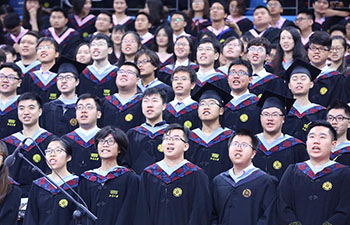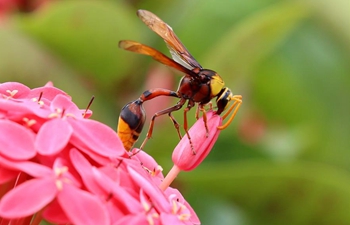by Xinhua writers Yu Fei, Qu Ting
BEIJING, July 11 (Xinhua) -- They provide positioning and navigation to vehicles, ships, shared bicycles and drones, as well as tracking wild animals, and China's Beidou satellites have also guided a young couple to love.
Ten years ago, Cui Bo, a designer for the Beidou power system, wrote a poem lauding those dedicated to space exploration to mark the 40th anniversary of the founding of the China Academy of Space Technology (CAST). He met his colleague Wang Lu, who recited his poem at the anniversary ceremony.
Wang, a designer for the Beidou payloads, was just like the people in his poem: dedicating all her knowledge and efforts to the development of China's own satellites. They fell in love.
They had, in fact, both graduated from Beihang University, which specializes in aeronautical and astronautical education and research, but they hadn't known each other then.
Named after the Chinese term for the Big Dipper constellation, Beidou is a rival to the U.S. GPS system, Russia's GLONASS and the European Union's Galileo as a global satellite navigation system.
When China launched its first Beidou satellite in 2000, Wang and Cui watched the live broadcast of the liftoff on television at the university.
After graduation, they both had offers of high-paying jobs, but they both chose CAST.
"We chose to work here because we share a space dream," Wang said.
"We watched the launch of the first Beidou satellite at the same time, and now we are participating in the development of more Beidou satellites," Cui said. "It's our destiny."
Engaging in the development of the second generation of Beidou satellites, they worked together in the production of the first inclined geosynchronous orbit satellite, which was key to global coverage.
The pressure of work brought out the best in each other.
"He is enthusiastic about his work. He often dugs into a problem for a long time. He is also warm-hearted, sometimes he would design a simple program to share with his team to improve efficiency," Wang recalled. "He's cool."
"She is very smart," said Cui. "Once I took a long time solving a geometric problem, but she took just 30 seconds to show me a simpler and ingenious solution. She's even cooler than me!"
The pursuit of the same dream binds them.
The second generation of Beidou satellites began operating at the end of 2012. The system, then with 14 satellites, provided navigation, positioning and timing services to the Asia-Pacific region. The same year, Wang and Cui married.
The research team is responsible for the development of the satellites as well as in-orbit tests. If a satellite has a problem, they must resolve it quickly.
In September 2015, Cui was sent to Xi'an, capital of Shaanxi Province some 1,000 km southwest of Beijing, to work on the flight controls of a newly launched satellite. He couldn't return home for their baby's 100-day celebration, which is an important occasion in Chinese tradition. Wang, instead, took their baby to Xi'an, so that the three of them could celebrate together.
"I will never forget the moment I saw her coming, with our baby sleeping in her arm, dragging heavy luggage with the other," Cui said.
Since 2017, China has sent eight Beidou-3 satellites into space. By the end of 2018, the Beidou system will service countries along the Belt and Road route.
Young space engineers like Wang and Cui are the backbone of the system. The average age of the Beidou team in CAST is 36.
Over the past five years, the system has helped rescue more than 10,000 fishermen. More than 40,000 fishing vessels and around 4.8 million commercial vehicles in China are equipped with Beidou.
The system has lifted the output of precision agriculture by 5 percent, and curbed oil consumption by 10 percent. Beidou is also helping monitor the structural integrity of highways, pipelines, dams and bridges.
It is also part of the daily life. More than 300 million mobile phones, 40 percent of all smart phones in China, can connect to Beidou.
The system now covers more than 50 countries with a total population of more than 3 billion. By 2020, Beidou will have more than 30 satellites, providing first-class services around the globe.

















